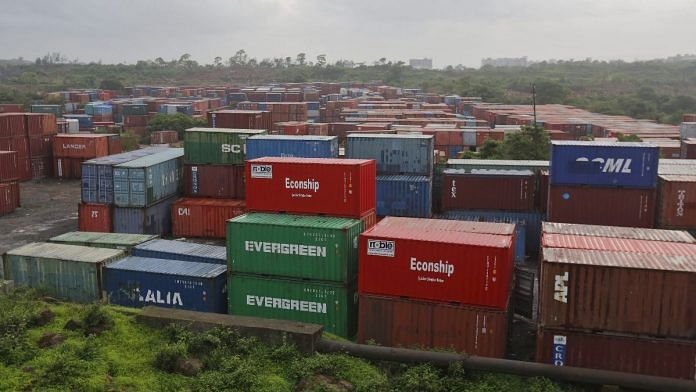New Delhi: India announced new restrictions on imports of jute products from Bangladesh Monday, banning their transport through land-based trade routes, effective immediately. This move follows an earlier one in June this year when India imposed a stricter duty on jute imports from Bangladesh.
In its new notification, the Indian Directorate General of Foreign Trade (DGFT) said the imports of specific jute products, including bleached and unbleached woven jute fabrics, twine, cordage, rope, jute cables, and jute sacks and bags, will no longer be permitted through land ports along the India-Bangladesh border. Instead, these items can only enter India via the Nhava Sheva Seaport, also called JNPT, in Navi Mumbai, Maharashtra.
The new notification continues the series of trade measures introduced by India in May and June this year, but does not explicitly state the reason behind the latest restriction. It comes as bilateral trade relations between India and Bangladesh turn increasingly tense. In May, India restricted the imports of Bangladeshi ready-made garments to Kolkata, thereby closing land borders. Coming on the heels of Bangladesh’s curbs on Indian exports at the time, the step was widely seen as retaliatory. In June, India additionally restricted the imports of jute products and unbleached woven fabrics.
Bangladesh responded by stopping yarn imports from India through the Benapole, Bhomra, Sonamasjid, Banglabandha, and Burimari land ports.
New Delhi has for long voiced concerns over Dhaka’s unwillingness to allow Indian goods, particularly rice, cotton, and yarn, into Bangladesh via land ports in India’s Northeast. Tensions escalated further this year after India rolled back a five-year-old agreement, stopping the transhipment of Bangladeshi goods to other countries via Indian ports and airports. The termination of that deal—previously seen as a goodwill gesture—signalled a shift towards a more assertive trade posture by India.
“Shifting the import route from land ports to sea—specifically through the Nhava Sheva port in Maharashtra—will inevitably create logistical challenges. For Bangladeshi exporters, moving goods via sea, rather than across the border, will significantly raise the costs. Once shipments arrive at JNPT, transporting them onward to eastern, northern, or southern India will add further expense,” Director General and CEO Ajay Sahai, the Federation of Indian Export Organisations, told ThePrint.
In practical terms, India’s latest move will likely make Bangladeshi jute products less competitive in the Indian market. In the short term, costlier imports could benefit domestic jute producers by increasing local demand. In the medium- to long-term, however, domestic prices may also rise unless production scales up. Indian prices tend to track import parity. If the landed cost of imports increases, domestic prices will often follow.
Regarding the timing of the restrictions—coming just two months after an earlier ban—Sahai clarified this is a different measure, one that appears more retaliatory. Two possible factors may be at play. First, Bangladesh has recently imposed restrictions on several Indian products, prompting a reciprocal response. Second, India is not banning Bangladesh imports outright but redirecting them through a more expensive sea route.
The cost implications are considerable. For example, jute products destined for West Bengal would now travel from Chittagong to JNPT before travelling back to Kolkata by road or rail—a circuitous route that erodes price competitiveness.
Against the backdrop of Bangladesh’s multiple recent actions affecting Indian exports, this move signals that India remains prepared to respond in kind.
Also Read: Good politician, bad statesman—what Muhammad Yunus’ one year in power reveals
Dhaka closes land ports too
Bangladesh is also taking steps that suggest a recalibration of its trade infrastructure. According to reports in the Bangladeshi media, the government has decided to permanently close three land ports, Chilahati, Doulatganj, and Tegamukh, citing “a lack of trade or immigration activity and inadequate infrastructure”.
A fourth port, Balla in Habiganj, will have operations suspended allegedly due to poor facilities on the Indian side.
In the year 2023-2024, India imported Rs 1,727. 72 crore of jute items overall, according to data from the National Jute Board.
India earlier imposed anti-dumping duties on jute products imported from Bangladesh due to its concerns over dumping. However, raw jute imports remained excluded from these duties. As a result, the overall impact of the anti-dumping measures is still limited.
Jute imports from Bangladesh—valued at $138 million in FY17—declined only slightly to $117 million in FY22 after the imposition of duties. By FY24, however, imports had surged to $144 million.
The continued high volume of jute imports pushed domestic jute prices below Rs 5,000 per quintal in FY25—lower than the Minimum Support Price (MSP) of Rs 5,335 per quintal, as set by the Indian government. The situation has led to financial distress in the domestic jute industry, with six jute mills shutting down and dues amounting to Rs 1,400 crore.
Towards the end of last year, India launched an investigation into jute product imports from Bangladesh, considering the imposition of countervailing duties (CVD). A petition filed by the Indian Jute Mills Association (IJMA) prompted the probe.
Since 2017, India has been enforcing the anti-dumping duties (ADD) on jute yarn, twine, sacking bags, and hessian fabric. However, the imports of raw jute from Bangladesh have continued to rise. In FY23 alone, raw jute imports increased by 19 percent year-on-year in value, reaching Rs 5,359 million.
India remains one of the top importers of Bangladeshi jute and related products. Bangladesh, in turn, supports its jute industry with significant export incentives: a 12 percent cash subsidy on hessian sacks and carpet backing cloth (CBC), 7% on jute fibre, yarn, and twine, and a 20% subsidy on diversified jute products, such as food-grade bags and apparel.
(Edited by Madhurita Goswami)





A recent survey, quoted by Chatham House, shows 11% of Bangladeshis have a favourable opinion of India, 75% of China. That needs working on. For other South Asian neighbours as well.